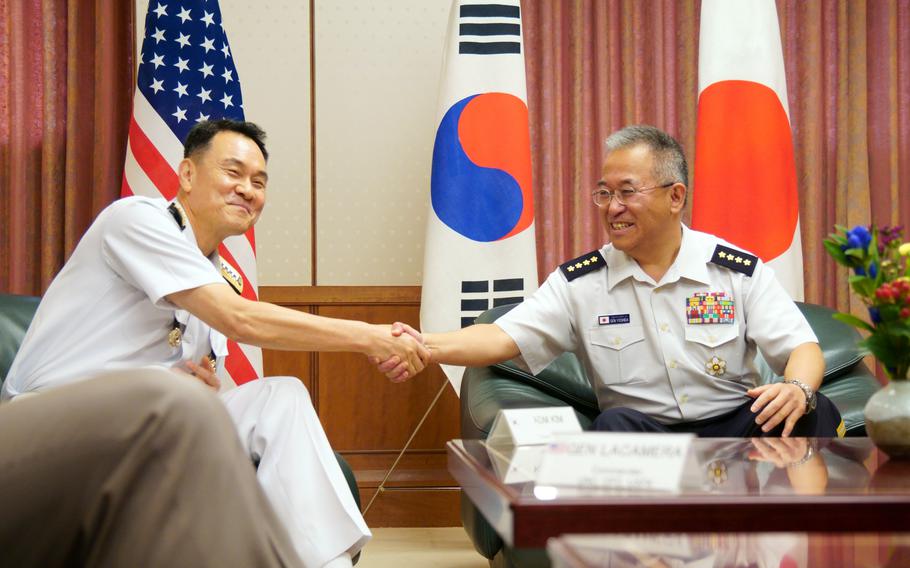
South Korean Joint Chiefs of Staff chairman Adm. Kim Myung-soo, left, shakes hands with Japanese Joint Staff chief of staff Gen. Yoshihide Yoshida during their meeting with top U.S. military leaders at Camp Ichigaya, Tokyo, Thursday, July 18, 2024. (Akifumi Ishikawa/Stars and Stripes)
TOKYO — The highest-ranking military officers from the U.S., Japan and South Korea gathered here Thursday to talk cooperation amid rising challenges from China, North Korea and Russia.
The meeting marked the second trip to Japan since November for Air Force Gen. Charles “CQ” Brown after becoming chairman of the Joint Chiefs of Staff.
“I expect that the three of us sitting here in Tokyo today sends a message to the regional threats, but also globally on the strength of the relationship, our alliance and the work that we do,” Brown told reporters while sitting next to his Japanese and South Korean counterparts at Camp Ichigaya, headquarters of Japan’s Ministry of Defense.
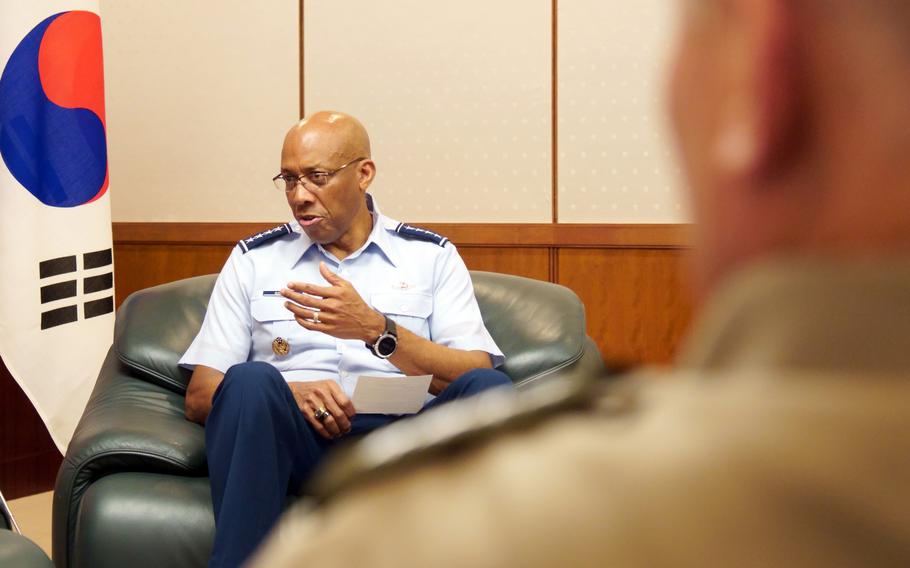
Air Force Gen. Charles "CQ" Brown, chairman of the Joint Chiefs of Staff, attends a trilateral meeting of military leaders from the U.S, Japan and South Korea at Camp Ichigaya, Tokyo, Thursday, July 18, 2024. (Akifumi Ishikawa/Stars and Stripes)
Alongside him were Japanese Joint Staff chief of staff Gen. Yoshihide Yoshida and South Korean Joint Chiefs of Staff chairman Adm. Kim Myung-soo.
The trio were joined by the head of U.S. Indo-Pacific Command, Adm. Samuel Paparo; U.S. Forces Japan commander Lt. Gen. Ricky Rupp; and U.S. Forces Korea commander Gen. Paul LaCamera.
Chinese aggression in the East and South China seas, North Korean missile tests and Russia’s invasion of Ukraine are among the challenges faced by the three democracies.
The United States has long encouraged its allies to cooperate on security, but those efforts have been frustrated by historical disputes stemming from Japan’s rule over Korea before and during World War II.
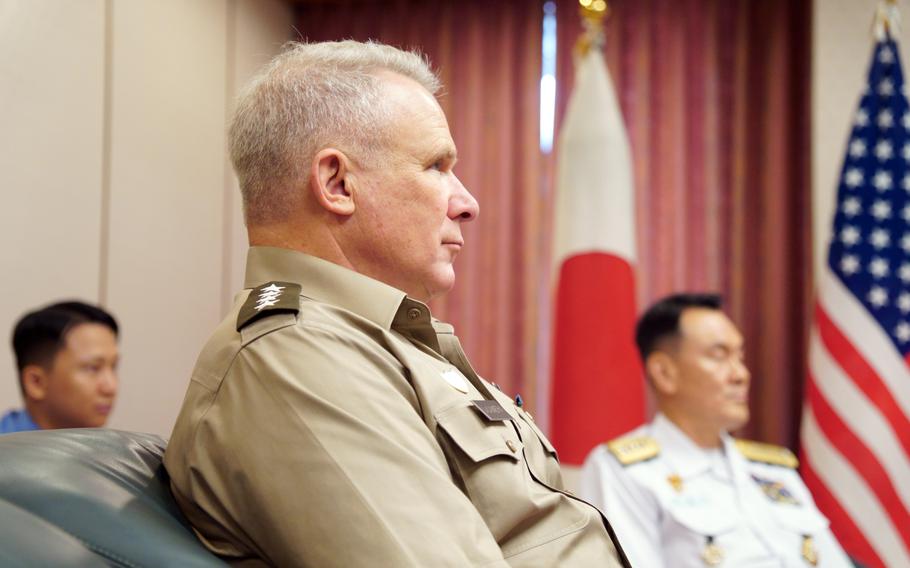
The commander of U.S. Forces Korea, Army Gen. Paul LaCamera, attends a trilateral meeting at Camp Ichigaya, Tokyo, Thursday, July 18, 2024. (Akifumi Ishikawa/Stars and Stripes)
Nevertheless, their military cooperation has surged since President Joe Biden, South Korean President Yoon Suk Yeol and Japanese Prime Minister Fumio Kishida held their first summit together in August at the Camp David, Md.
The leaders pledged to boost their military ties to confront North Korean “threats that affect our collective interests and security.”
Since then, the three nations have held unprecedented trilateral drills involving their air forces, navies and coast guards.
Last month, for example, they carried Freedom Edge, training near Japan and South Korea that involved multiple aircraft and ships. It focused on missile, air and cyber defense, anti-submarine warfare, maritime interdiction and search and rescue.
“Coming together is a beginning; keeping together is progress; working together is success,” Brown told his Japanese and South Korean counterparts, quoting 19th century American author Edward Everett Hale. “The three of us have a responsibility to ensure the momentum continues.”
The Tokyo meeting aimed to advance what was agreed upon at Camp David and in June at Singapore, he said.
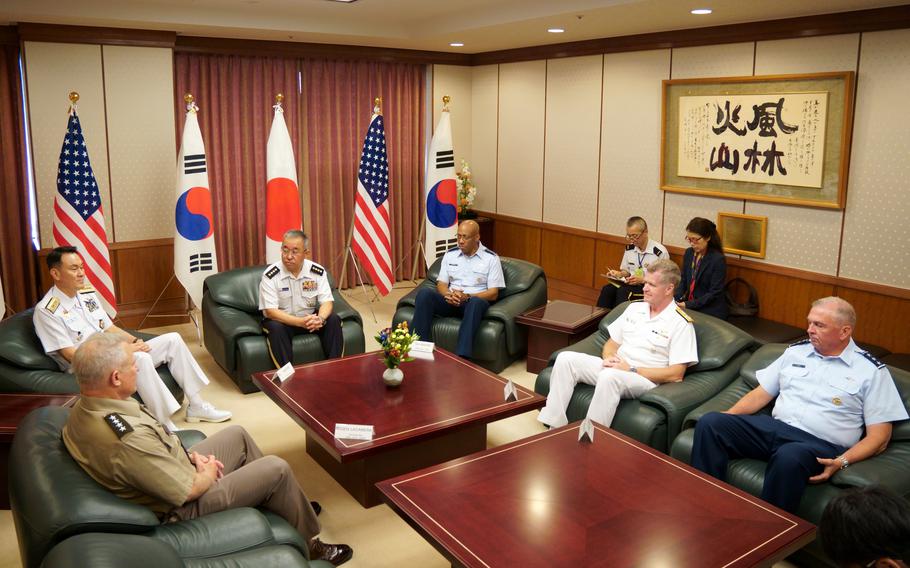
Top military leaders from the U.S., Japan and South Korea, including Air Force Gen. Charles "CQ" Brown, chairman of the Joint Chiefs of Staff, meet at Camp Ichigaya, Tokyo, Thursday, July 18, 2024. (Akifumi Ishikawa/Stars and Stripes)
Defense Secretary Lloyd Austin, Japanese Defense Minister Minoru Kihara and South Korean National Defense Minister Shin Won-sik agreed on the sidelines of the Shangri-La Dialogue in the Southeast Asian city state to develop a cooperation framework that would include information sharing and more trilateral exercises.
Efforts to change the status quo by force in the East and South China seas, Russian aggression in Ukraine, a deteriorating situation in the Middle East and military cooperation between Russia and North Korea were challenges outlined by Yoshida ahead of the Tokyo meeting.
“It’s extremely important for us three nations to demonstrate our unity to ensure regional stability,” he told reporters.
As Yoshida and Kim shook hands, Yoshida said: “I’m looking forward to talking with you to further develop trilateral security cooperation to ensure peace and security on the Korean Peninsula and in the Indo-Pacific.”
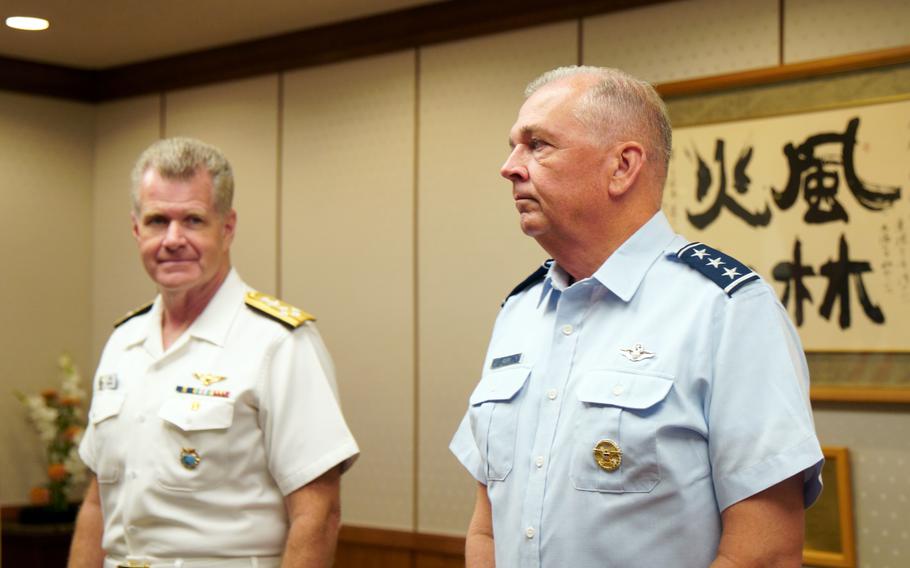
The head of U.S. Indo-Pacific Command, Adm. Samuel Paparo, left, and the commander of U.S. Forces Japan, Air Force Lt. Gen. Ricky Rupp, attend a trilateral meeting at Camp Ichigaya, Tokyo, Thursday, July 18, 2024. (Akifumi Ishikawa/Stars and Stripes)
Japan’s Joint Staff, in a statement issued after the meeting, said the leaders also visited Yokota Air Base, USFJ’s home in western Tokyo. There, they reaffirmed cooperation for real-time trilateral missile warning data sharing to counter North Korean threats.
“They condemned [North Korea]’s continued development of its unlawful nuclear and ballistic missile programs and provocations as well as the growing military cooperation between [North Korea] and Russia,” the statement said.
It noted “escalatory, dangerous, and aggressive behavior supporting unlawful maritime claims by [Beijing] in the South China Sea and throughout the region,” adding that the military leaders reaffirmed the importance of maintaining peace and stability across the Taiwan Strait
Top military officers from the three nations plan to meet in South Korea next year, the statement said.